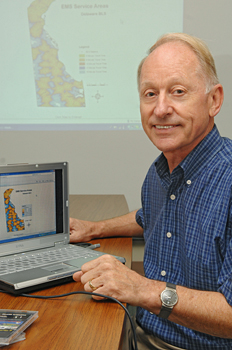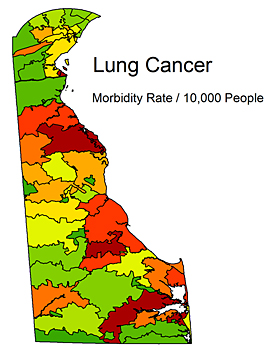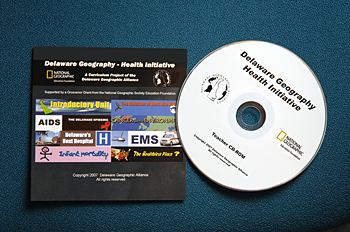Each of the units on the CD, which is available free of charge to all Delaware teachers and students, focuses on a particular health issue and helps students use geographical analysis to solve real world problems, Peter Rees, UD associate professor of geography who authored the project, said.
“What we have done is to set up a series of research problems, such as whether cancer in Delaware has environmental causes, and then provide mapped information that students can use to explore the question,” Rees said. “By arranging the information in a distinct way, we can anticipate the path a student will follow to reach a particular conclusion and thereby understand how looking at a problem geographically can be a valuable strategy.”

“Only four of Delaware's 34 public high schools offer a general geography course and an additional four offer an advanced placement course in human geography,” Rees said. “Only three high schools have a social studies teacher with a geography degree on its staff. No private or parochial schools offer formal geography courses at the high school level, and, although geography is a separately identified subject in the state's social studies standards, and geography questions are regularly asked on the statewide student assessment test, geography education in high schools is rudimentary and student geography test scores rank lowest of the four subjects tested--history, civics, geography and economics.”
Other teaching units look at where Delaware's next hospital should be located, which areas of the state are least well served by emergency services, whether or not AIDS in the state is restricted to a class of the population and if the placement of prenatal care facilities in Delaware affects levels of infant mortality. An additional unit investigates the location of the healthiest places in the mid-Atlantic region. Students also can investigate the diffusion patterns of West Nile fever at a national scale.
Rees said research results from the initiative contain important information relevant to the contemporary health issues in the state.

Rees said he hopes that the teaching units, which have been adopted by the Delaware Department of Education as part of its recommended social studies curriculum, will finally stimulate greater attention to geography at the high school level in Delaware.
“We aspire to offer a world-class education in the state, yet how can this happen if we ignore geography?” Rees said. “Many other countries make the subject a core part of their curriculum--clearly, we have a long way to go.”
For more information or to order a copy of the CD, call the Delaware Geographic Alliance at (302) 831-6783 or e-mail [rees@udel.edu].
Article by Martin Mbugua
Photos by Kathy F. Atkinson


